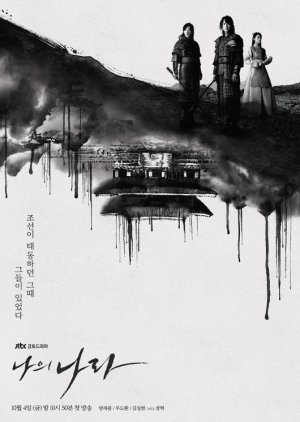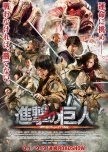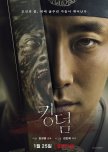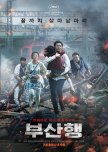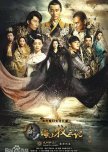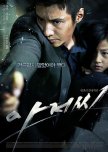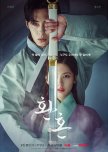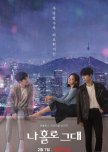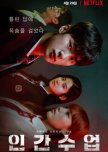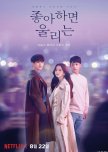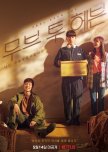
Like a Collection of Character Studies
I have an odd relationship with MC:TNA because it lives in my mind rent free but my experience watching it was really messy (on my part). I actually finished the show earlier this year, in February, and it was 100% an impulsive watch and I have never seen any of the actors' previous works so I not only went into the drama blind, I was completely unarmed. The first time I watched it, the politics-heavy plot-line went completely over my head and I was at a point in my life where I would shrug at every mild to severe inconvenience that came my way and moved on, so I barely digested the actual story at all. I was initially pulled in by the plot summary promising me a focus on a platonic relationship between the main characters so I zeroed in on the friendship, and that was it.I recently went back to watch it again in September and since I was in a different headspace—plus I did a bit of reading to gain more contextual understanding—I was able to absorb the story a /lot/ better. Still, MC:TNA always struck me as a collection of character studies between the prominent characters (Hwi, Seonho, Huijae and Bangwon) and their dynamics with each other as well as the other supporting characters, with a genuine historical event as the backdrop. I'm a sucker for these types of "small-scaled" shows (in the sense where there isn't a major, tangible overarching plot-line) so I'm easily positive about this drama—my only mistake is choosing to watch a historical Kdrama based on real historical events showcasing real historical figures with explicit mentions to other real historical figures, who don't actually show up on-screen at all, when I know absolutely zero (0) things about Korean history. That one's on me.
Nonetheless, MC:TNA holds a special place in my heart (I keep struggling to rate it 8.5 or 9.0, and every now and again I go back and edit the rating—one feels too low for my attachment, the other feels too high for its objective quality; I wish I could put it as an 8.75 but I guess that's not much of a difference in the grand scheme of things,,) and I have a very personal attachment towards it—that's me saying I don't come from a very objective standpoint when I talk about this show. I liked the character-driven narration, I liked the focus on the different perspectives and nuances in friendship and family dynamics, I liked the differences between the characters' ideologies and how that generated conflict between them, I liked the introspection and the portrayal of the different sides of being human, I liked the mix of "complex" and "simple" characters rooted in how prominent their ambitions were and how that tied to their core as individuals, I liked the emotive placement of some of the foreshadowing and dialogue (that I can specifically pinpoint and quote my favourite parts), I liked the symbolism, the cinematography, the thematic parallels, and I liked the circular ending—to me, it was adequate (ironic, touching) closure. I'm conscious of the criticism the show receives, the most popular being the hilarious (but consistent enough) plot armour, but I think the show also achieved what it came out to do quite neatly, which I appreciate. Nothing is without flaws; I think I can say I liked MC:TNA's imperfections too (within reason).
It might be because I usually gravitate towards more melancholic things but I also really liked the poignant storytelling of MC:TNA that centred around loss, guilt, grief, remorse, and loyalty. I think everyone in the show nailed their emotional scenes. I know it's already been said a million times now but I genuinely appreciate Woo Dohwan's grasp on his characters' emotions and then his expression of them (in Episode 10 and 13, iirc, there is a scene where his use of micro-expressions was especially commendable, among his other scenes). His portrayal of Nam Seonho made me sympathise for him from the get-go and while I understand that some of his motives can seem contradictory/nonsensical at times, I also believe that his variabilities aligned with how his character is someone who often does things against their own self and lies like it's a competitive sport. Though I naturally sympathise for characters like Seonho, WDH made my empathy completely unapologetic despite the often douchebaggery stunts Seonho pulls (he was doing his best!). But that's another thing I liked about MC: how polarising it can be; there are so many ways you can interpret and critique the characters, based on your perspectives.
I think MC:TNA is quite a niche(ish) show, so I believe it can be a bit of a hit or miss for people. It's not a romance and was never built up to be so, so the romantic plot-line between Hwi and Huijae is understandably on the backseat compared to the friendship between Hwi and Seonho. The political intrigue is also heavy, and the story is driven more so by the characters than the plot, so it really is up to preferences. However, if you like, or are feeling up for, political and dramatic plot elements, very flawed characters and top-notch fighting scenes (+ gorgeous scenery shots), then do give MC:TNA a try. (It is also, in my humble opinion, WDH’s best work and his best role; the months in between first watch and rewatch is an unapologetic exploration of his filmography). It's not quite a “digestible” drama per se but I’d like to call it a "thinking" drama, and those are always nice.
Was this review helpful to you?

the story, although got too monotonous for me at a point, the characters and the complexity of their relationships and emotions got me through it. had tissues next to me the whole time. dohwan, sejoeng did so incredible of amount of praise would be enough. such an incredible drama about what a country means for someone, friendship, trust and love and i am at a loss for words. the actors made it for me, did it for me, i knew they were already amazing but oh God this just threw me off my track. all the actors were incredible but i must say that dohwan really outdid himself and stood out for me, portraying such a complex character with such an intensity i often forgot it was a drama and that this isnt dohwan but soen ho, and oh my GOD. wow. soen ho was possibly my favourite character too, so flawed, broken, lonely, afraid and underappreciated. what a role dohwan played and how excellently. omo. im getting emotionally just thinking about it oh no.
the majestic ost made the scenes even more intense than they already were. you could help but feel the chaos and unease of war and battle, that too against your friend. the pain was felt by the writing, the acting (the most) and the ost combined. oof it tugs at my heart everytime i think about it. so upbeat and moving, but carrying such a sadness.
underrated, chronolically underrated, but a must watch for only those who can endure the sheer sadness of the show. incredible, 15/10 for the feels, visuals and emotions. whos gonna pay for my therapy tho because i wont be getting over this anytime soon.
Was this review helpful to you?

Story/Characters:
The plot moves along quite quickly. There’s enough action in each episode to keep me entertained. More than half the drama was very strong. I felt happiness, excitement, horror, dread, and heartbreak. I love when dramas are able to bring so much out of me. In the later arcs (last 4-5 episodes?), I felt the plot was repetitive in terms of all the fighting and revenge.
The writing for Hwi and Sun Ho could had been better. They had one-track minds, pulling all stops to reach their goals. Sometimes I sighed and wished they saw the bigger picture. Granted, they acted high on emotions. Without giving too much away, their actions, at times, felt illogical and only served to lead towards their ending. Though everyone was morally ambiguous, my heart especially went out to Sun Ho who was cornered into making such extreme decisions alone. While Hwi had a whole squad behind him, Sun Ho merely had one loyal soldier, who surprisingly stole my heart, by his side. Sun Ho was such a heart-wrenching character to watch as he was torn between family and friends, wanting to be acknowledged as a proper son and wanting to protect his friends. I loved him no matter how destructive he evolved into.
Hee Jae was pretty much a bland character. Her existence felt so minuscule. By being delegated as Hwi’s love interest, her significance to the story and potential as the leading female fell straight through the cracks. I wish they had abandoned the romantic line. Hee Jae (and her association with the information-collecting Ihwaru) could have had a much stronger influence on the plot.
How could I not talk about Yi Bang Won. Only in sageuks can you feel compassion for such a notorious historical figure. This portrayal of him is similar to the one in Six Flying Dragons, which I have no qualms about because I enjoy an antihero. The setup of his background does well in leading me to pity him, unable to completely hate his guts for everything that’s gone wrong with the main leads. He is such a fascinating character that demands your attention with his presence.
Acting/Cast:
One thing I appreciated was the solid acting from everyone. I find, especially in sageuks, that the supporting cast members really nail their roles and make them memorable. You either adore them or hate them to the bone. If the character is Yi Bang Won being played by Jang Hyuk, then you will love and hate him with every fiber of your being. Seriously, what a performance by Jang Hyuk.
Chemistry:
Let me preface this by saying romance is absolutely not the focus of My Country. There are more important issues to address in the world these characters live in. With that being said, I found absolutely zero chemistry between Hwi and Hee Jae. Their scenes together felt unnecessary, an afterthought almost. I found the bromance between Hwi and Sun Ho to be much more angsty and compelling. Though their views differed, I could still see and feel their loyalty to one another, and the lengths they would go for each other.
Ending:
Although the bromance in the beginning was strong, Hwi and Sun Ho were apart and at odds for more than half of the drama. So many misunderstandings between the two, but their reunion was short. I’m not sure exactly why I was not bawling my eyes out. Even if I had expected it, I still should’ve at least shed some tears? Alas, I only felt a deep sense of emptiness. I am familiar with the historical events during the time period between near the end of Goryeo and the beginning of Joseon dynasty. As the plot played out, I saw no other option. This may have lessened the emotional impact on me.
Each character has their own sense of what their country should be. They scheme and mostly use their swords do the talking to realize that dream. Even if it means sacrificing themselves, one will not hesitate since their country is something bigger than themselves. The ending is proper. I accept it.
Was this review helpful to you?
This review may contain spoilers
For once Korean drama I did not like.. Where was the romance? Lead actress was the whole series like a spare part, lead male showed barely any interest in her, for the years she promised to wait for him and confessed her love all she got out of it were few awkward hugs and holding hands and lies- as in you are most important in my life and then he went off and CONTAINS HUGE SPOILERS BELOW:got killed even the enemy he started the rebellion over was already dead. What a fool. It was also unrealistic how many times they could survive being stabbed fully with a sword, once.. Okay.. 2,3.4 times? As if. Actors were great storyline sucked.
Was this review helpful to you?

This review may contain spoilers
Beautiful drama with a great bromance
This was my first kdrama over all and my first time seeing Woo Do Hwan. My first thoughts were wow everyone is so beautiful in this drama but I was quickly captivated by the storyline and the friendship between Nam Seon Ho and Hwi. Upon nearing the end at episode 14 I couldn't stop crying because it was more than evident that the two best friends would have died. I hoped that Seon Ho and Hwi would have settled their disagreements long ago and work together. The scene where Seon Ho finally got to eat with Hwi and his friends breaks my heart. It was probably the only time Seon Ho thought he belonged somewhere only for his life to be taken away from him.Was this review helpful to you?

That's what I thought when I saw the cast list with Woo Do Hwan and Yang Se Jong on it and I wasn't disappointed.
Having seen them in Mad Dog and Duel before and knew they are talented and aspiring actors.
I was happy though to see that all of the cast were doing a perfect job. I was drawn into this drama instantly.
My review probably won't do this great drama justice but I want to try nonetheless.
The synopsis tells everything you need to know at the beginning. The best friends Seo Hwi and Nam Sun Ho both strive for a "better" country. Each with different dreams and values as they struggle with their current perspective of life.
But wanting to make a change in the governance of the country means you'll get in the middle of power struggles and will have to bear the consequences...
The story itself is full with said power struggles so you'll get to see a war in the first few episodes and more fights later on throughout the drama and in the middle of them, our male leads.
They get hurt a lot and I read comments saying it was being illogical that they get out alive all the time.
Have I thought that some injuries were life threatening? Yes. Did I mind when they still turned out to be okay? Not at all.
Simply because that's what I wanted to see anyway and it never got to the point of being obviously unrealistic. In fact, it would've been strange to see a lot of sword fights and the leads coming out completely unscathed.
Anyway the story is clear. The tags of War, Power Struggle and the genre Tragedy are there for a reason.
Actually none of them could be considered my favorite thing to watch. Quite the opposite.
Which is probably why I took a break after the half of the drama as it got pretty intense and a bit too much for me even though I loved it, I craved for something more lighthearted in between.
But when I picked it up again I finished it in a couple of days and binge watched it. There is romance in this drama, actually more than one pairing (no love triangle) and I adored each one of them.
The cast is awesome and their acting superb. I came for Woo Do Hwan and Yang Se Jong and stayed for all of them.
I cheered for couples, enjoyed the playful banter between friends and comrades and watched with curiosity the dialogues between those who fought for power.
Specially Kim Seol Hyun was a joy to watch. She's playing a smart and strong female that grow in the progress of the story. I loved the scenes with her. Also the supporting characters. I grew fond of quite a lot which makes it hard to say goodbye to this drama. I'll be back for a rewatch for sure!
The music is a gem for the ears. The first time I heard the melodies I fell for it and got the OST for my playlist.
It fits the drama perfectly but can also be listened to on its own. There are calm tunes and epic ones, you'll have to check it out.
The rewatch value for me is high. I enjoyed the emotions this drama showed, the cast, the acting, the story and how the characters developed. I'm not claiming it's perfect as tastes differ, but I really love it and can only advise you to give it a go when you consider watching it.
Was this review helpful to you?

This review may contain spoilers
01/03/2024 (March).I really enjoyed this drama as it was fast paced and interesting, but it did have its minor flaws like seriously injured fighters being able to fight later the same day or the next with very little recovery time. Not plausible in that sense at all. I, at least, can live with that as I suppose only so much can be done in a one hour episode with 16 in total.
Have to say this series was really well done - I didn't find it confusing nor did I find the music a problem at all.
The bromance, friendship and bond between Hwi and Seon-Ho was truly awesome so it was a bit disheartening to watch such a deep friendship deteriorate somewhat. I actually believe their friendship suffered significantly when Yeon really truly died - not before.
I really wonder had Yeon survived would both have made different choices.
As for Yeon, she was the light in both Hwi's and Seon-Ho's lives. When she was killed it caused Hwi and Seon-Ho to seperate for a number of years - during this time both followed different opposing paths in their pursuit for revenge on her behalf as well as fighting for a cause (opposite sides) that put their lives on the line as well as the possibility of fighting one another to achieve it.
Hwi at first wanted revenge more than anything only this changed later on when he saw several innocent people slain because of him and the Prince whereas with Seon-Ho revenge was a top priority, but also rising high in status and power so as to make a difference in the world.
It is understandable why they fell out, but such a shame as they were such good friends and for years.
Furthermore, Seon-Ho may have made some questionable decisions, but more or less it was because the choices he was given were either bad bad or the worse case scenario. e.g. Death.
What was never truly broken, however, was the strong bond between both friends.
SPOILER ALERT!
I appreciate the scene in which Hwi got to thank Seon-Ho for protecting him and also letting him know he was sorry for not seeing his friend's pain because of being so consumed in his own anger. Also, when Seon Ho told Hwi more or less that he looked too far ahead and too far up yet when he finally looked behind him he saw Yeon and Hwi there - just one step behind him was "his country", also, that he wished he had seen it sooner.
It took all their trials and tribulations for Seon-Ho to fully realise that what was most important in his life above wealth and status were his childhood friends who were more than that - they were his family, blood, lifeline and whole world.
Before I forget - I have to acknowledge the trio that supported Hwi and the one guy that stood by Seon-Ho right to the end, however, for the most part Seon-Ho was all alone in what became an insufferable existence for him. So, to see him and Hwi reconcile near the end of this drama after being apart for so long and to fight their last fight together against the real enemy was quite fitting for this soul connected duo - even if bittersweet.
On an end note - I would really have liked the last scene to have been something like Yeon meeting them in the afterlife as well as all three graves side by side phasing out to blackness.
ALL THE ACTORS WERE ABSOLUTELY BRILLIANT!
I liked both Yang Se-Jong and Wu Du Hwan and couldn't imagine anyone else doing their roles.
WOO DU HWAN:
I just want to say that Woo Du Hwan is one of the best male criers I have ever seen on screen among other emotions.
Have seen him in Bloodhounds and now this one - he does both characters justice.
His range is a wow factor whether happy, sad, angry, vengeful, surprised, caring and in emotional turmoil.
When Yeon died I found Seon-Ho's tears more impactful than Yang Se-Jong's (Hwi) for some reason, as well as his internal pain, conflict and suffering. One could have easily believed that he was her real brother because of how he reacted to her death and the silk phoenix embroidery design she left behind in her room. He was that convincing! Mind you, Woo's character, Seon-Ho, was a brother to her just like Hwi and he protected her just as much even at the risk of his own life. But when she died - it was his crying that caused me the most sadness because it felt so real plus I knew that his burden was the heaviest one to carry... and all alone.
This drama had realism to it that some historical dramas just don't have at all.
Totally recommended plus it is something that can be re-watched even though it does have a sad and tragic ending. AAA+++
Was this review helpful to you?

Your Country: The Imaginary Age
I have a thing or two against impervious plot armors that goes to the extremes and this drama was structured around that. The way these characters shrugged off serious injuries and strong poisons without a hitch was just plain comical circus performance. It made the whole series lose its credibility and left this sour taste lingering in your mouth. The characters transformation and development marred the story with crazy inconsistencies and illogical character arcs for the sake of forced progression. Everything went downhill after episode 4, it relied on these outlandish situations that made it way too hard to remain invested. It strained our ability to suspend disbelief way too often to be forgiven. One of the action soundtracks was straight up just a Eurobeat soundtrack, really odd and unfitting choice. Kinda ruined some action scenes. On the bright side, we had Jang Hyuk and some nice action scenes.Was this review helpful to you?

Heartfelt Korean Historical Drama
This storyline was epic although through all the death stabbing no main character dies till the very end. I did also enjoy the music score for this drama as well. The cinematography, special effects, and character building are so good.The bond between friends make you rethink even your own friendships, "like who are really loyal too?" lol
Who you think will die, lives and who you think will live, dies. Then add all the emotion Rollercoasters to twist the plot.
The entire experience had me eager for more. Great work and this drama is #1 on my Favorite Korean Drama list.
Was this review helpful to you?
One thing I do not like is the habit of Korean films & dramas to take 1-2 minutes at the end and show out-takes, the behind the scenes workers, and generally characters happy smiling and being very friendly to even their drama adversaries. It detracts from the all over feel of the drama/movie. I dislike it so much that I just turn it off.
It totally ruins the feel one has for the drama/movie.
Was this review helpful to you?

This review may contain spoilers
Are we really the victims of the compulsion of the bitter and sweet fate that happens to us?
This drama was certainly not the most well-made and perfect drama that I have seen so far, but it was certainly one of the most meaningful and influential. This drama has several layers that get deeper from one layer to another and brings with it deeper and more beautiful concepts. Its first layer is the narration of a certain period of history. The second layer is a story of friendships, loves and sacrifices, and the last layer is the deep psychological growth of the characters, especially Sonho's character, which is the biggest lesson and message of this drama.This drama very well accompanies the audience step by step in the development of the characters and ultimately leads the audience to growth and prosperity. It is as if the main character of the drama is the audience itself, but the character who is outside the camera frame and every part of his personality is institutionalized in the heart of one of the characters of the drama. But in the meantime, Sonho's character is that part of our personality that plays the biggest role in our feeling of happiness or pain.
From the beginning of the drama, we witnessed bitter and terrible events that plagued Hui, but in the end, it always seemed to be Senho who felt a deeper and more deadly pain inside him, but why? This drama has highlighted the role of 3 factors for us:
1. Support: From the very beginning, we could see the existence of supporters who supported Hui with pure love and affection. Hee-jae, Moon Book, Chido, Jung Beom, and Bang Won, all of these people were by Hui's side and shared in his pain under any circumstances, trying to heal it. At the forefront of all these people was Sonho, who we witnessed his grief for Hui since childhood when Hui's father was buried, and this continued until the end of the drama. But it seems Sonho was always alone in his sorrows. Without any support or backing. Alone, alone. At the peak of his loneliness, Yeon became his only companion But the duration of this companionship was short-lived like Yeon's life. And after that, Sonho was so broken that he could no longer stand upright. Remember Sonho's dialogue after Yeon's death: "I lost someone. The only person who loved me and trusted me." In fact, Yeon gave Sonho something that Sonho had been screaming and pleading for his whole life. But where did this bitterness and lack of support come from? Perhaps the next two factors can be involved in shaping this factor.
2. Sonho's personality: Sonho had a unique personality. But until you are an introvert, no one will know about your inner beauty. Sonho swallowed the fire of his pain and his loved ones and burned from the inside, but he did not complain. He knew the meaning of pain better than anyone else; Because he had spent every moment of his life with it. He did not want those he loves to experience pain, so he made all those pains his own. He smiled despite the pain and played the role of the oppressor despite being a victim. No one grieves for a sad tyrant. Remember Yeon's dialogue (your facial expression never changes, you smile when you're tired, you smile when you're sad about something, sometimes you just smile. You can cry on my shoulders, you have nowhere else to cry) and This was the understanding that distinguished Yeon from others for Sonho. Sunho's introversion was clearly seen in the dialogues exchanged between Chi Do and Sunho at the end of the drama (Chi Do: Your wound is too deep. Sun Ho: I got used to being wounded. Chi Do: You can never be wounded Get used to it, every time you get hurt the pain comes back and every time you get hurt, all you can do is scream. It's okay to scream sometimes when you're in pain).
Sonho was born with pain. Being born as an illegitimate child from a servant mother and a father who did not accept him as his son. The deep pain that his father inflicted on him after the death of Sunho's brother and created a nightmare for Sunho that haunted him for years and would not let him go (remember Namjoon's dialogues after his son drowned, saying: "Why? Why are you the one who survived? You should have died instead of him. You should have died instead of my son). He grew up instead of his brother and his own identity became nothing, which is what Sunho hated. The pain of death. His mother, who was his only refuge. Also, the peak of his hatred for his father because he saw him as the cause of his mother's death. He grew up and all his pain, anger and hatred grew with him, but even Hui who was Sunho's closest friend He was also never aware of his sufferings. Remember the scene of the return from Liaodong (A. Who left you here to guard? I asked who ordered you? B. The commander in chief of the right wing army, Namjoon. A. It is not possible, his son. Our companion B. ordered us to kill his son first if we catch him.) It was here that Hui was shocked when he heard this, but soon he forgot it.
Sonho gave his whole life for Hui without any remorse. He had a big dream in his mind and for years he had planned every single step on the way to achieve it. He had dedicated his life to this ideal and every time he patiently put the beads of these two minnows together one by one to reach his goal, but every time when there were only a few beads left, he suddenly fall apart the beads to save Hui and without a moment's hesitation he would rush to help Hui. He blamed himself many times and promised himself that he would not give up his life and purpose because of Hoi, but he broke his promise every time. Kim Dong-won also asked him many times to come to his senses and leave Hui, but he could not turn his back on his friend even though he mercilessly wounded him every time and ignored his help. Several times in several different scenes, we saw the same thing that beautifully depicted Sunho's inner self. We saw that when Hui is in danger, Sonho pulls himself out of his problems and reaches Hui, shields his hand in front of Hui and shouts for him to leave, and he stands in Hui's place and He struggles with problems. The arrows that were supposed to target Hui were aimed at his body, and the swords that came to wound Hui injured him. No arrow injured Sunho's body except that it had torn Sunho's heart before. It was as if Sonho was saying you stay alive, if necessary I will die instead of you
3. The role of the family: At the beginning of the series, we saw Hui jealous of Sunho's status and social position and his aristocratic father. Hui felt that due to having a father from the noble class, luck is on Sonho's side and a bright future will await him, but he himself will not have good luck due to having a father who has the stigma of theft and betrayal on his forehead. Remember the following dialogues exchanged between Sunho and Hui (Hui:Hey, Mr. Ashrafzadeh; Have mercy on me. Sonho: Leave these compliments. Those who are born from mistresses are considered only semi-nobles. In fact, if your mother is a slave, you become a quarter noble. What an incomplete and worthless patch. Hui: Exactly. But you are someone who is made of silver; While I am a worthless stone. Sonho: Wow, how much you talk nonsense every time you open your mouth. Hui: Anyway, half of your destiny is determined by the person you are born from. I am jealous of you. You have a rich father). However, Sonho had a different view:(Sunho: You said that the person who gives birth to you determines half of your destiny. It means that we can change the other half. Hui: Fate is not something that you can easily change).This was Sonho's deep belief. A belief based on which he had set his aspirations and goals well. But which of them was right?
Hui, who was complaining and dissatisfied with the stigma of his father's traitorous name, attracted many supporters because of this father's name, especially Hijeh, Chido, and Bangwon, whom we mentioned in the description of their support and their role in saving Hui. However, this was the name of Sunho's aristocratic father, which not only did not bring him honor and patronage, but also drove his supporters, friends and loved ones away from him one after another. Like Hijah, Hui and many others. Everyone judged Sonho because of his father; But how painful it is for someone who you have grown up with since childhood like a brother, you have shared his happiness and sadness with him moment by moment and you have grown up next to him, does not know you properly and judge you. Maybe Sunho could expect wrong judgment from anyone else, but not from Hui. But in spite of all this, none of these two people were condemned by the Predestination of the father's name.
The creators of this drama, in the first 2 / 3 of it, were able to instill Sunho's deep pain to the audience and make it understandable to the audience. In such a way that we can feel this pain with all our being and maybe even be angry with Soo Hui for neglecting Sunho. Hui who, after seeing Sonho's ruined condition, at the moment he wants to kill himself, leaves him and leaves, and even after 2 years, he doesn't remember him. He doesn't even know if Sonho is dead or alive after that day. Until Bang Geun brings him to himself and makes him remember Sunho again and look for Sunho (Remember the sequence where these dialogues are exchanged between Bang Geun and Hui: (Bang Geun: I have always had penchant for two swords, one of you and the other of your friend Sunho. One of them is rotting While that one has disappeared and no one has seen his body yet, is it true? Hui: He is no longer my friend, so ask somewhere else. Bang Gun: Well, you joined the man who killed his father. I doubt it matters to you what happened to him).And how bitter was the scene when Hui enters Sunho's empty room and realizes how lonely Sunho was. It was from here that Sonho's every effort for Hui got a different color and he understood their true meaning. Yes, Sonho spent every moment and every hour of his life trying to protect and protect his friend and brother Hui, but all those efforts were interpreted differently by Hui. Remember the following beautiful dialogues from Hui (Thank you for supporting me and I'm sorry that I was so engrossed in my own anger that I couldn't see your pain) or this dialogue (Did you know that whenever I was in pain, you were always by my side?) And the scene where he remembers his sister's words (No matter what happens, never lose Sunho. He was the only one who held our hands when everyone else treated us like ghosts. He and the mosquitoes are the only ones who love you. ) What a good anthropologist that simple and inexperienced little girl was. But now that everything is clear to the audience, why do we hear this dialogue from Sunho? (I realized that a life like this is not so sad. I always thought that I only have two choices in my life. A bad choice and a worse choice. But I could have another choice, and I deliberately ignored it). Sonho has found the limit of happiness within himself. Sunho now realizes that each person makes his own bitter or sweet destiny and decides whether he wants to live with pain or with happiness. If we have chosen sweetness for our life, no pain in life can make life bitter to our taste. Sonho finally realized that living with pain is only the result of a choice. Choosing sadness from sadness and happiness. Sonho was full of sweet possessions that he just ignored, this is what almost all of us do with our pains. Hui's dialogue in response to Sonho's words in the previous dialogue is very interesting: (If I were in your place, I would only see the same two options. What do you think, to have an easier life from this moment on? A life in which there is a smile). The first part of Hui's speech may be the heart speech of many of us. If it was me, I would have made the same choice, and of course it's true because when we are in pain, can we see anything other than pain, even if that thing is right in front of our eyes? But what about the second part of Hui's talk? Is this just a reply to Sonho or an answer to our question? Hui tells us that you too find the limit of your choices. When you know the border, everything becomes clear for you. Now you can choose happiness and live a life full of smiles. This concept is the biggest concept that urges the audience to come to their senses. We alone are responsible for all our pain because we have made our own decisions. We are the ones who decide to make the pains the milestones of our lives and lead our lives on their path, or to choose small joys instead and leave ourselves in their hands. Remember Sunho's meaningful and touching dialogue in the last moments of his life (I was only staring at miles away and when I finally looked behind me, I saw you and Yeon. My homeland was just one step behind me. I wish this I knew earlier). This beautiful concept of choosing between pain or happiness is also beautifully drawn in the drama Just between lovers (which is another product of the director of the same drama). Especially in the scene where Kong Doo decides not to mourn his grandmother's death anymore. A pain that he never thought he would be able to overcome
A book can be written about this drama. It was as if he had something to say at every moment, but even so far, my conversation was too long. So I will try to limit myself to pointing out some of them. For example, in the dialogue in the initial flashback of the series, Hui says: swords are like Confucius and arrows are like Mencius. During the series, we saw Sonho with Lee Song Yi's sword and Hui with a bow on his shoulder. With a little knowledge of the two schools of Mencius and Confucius, it is possible to understand and understand all the actions of Sunhu and Hui in a more correct and deeper way (discussion about it can multiply the volume of this article, so I will refrain from explaining it further). Or Hijah's character, which may be considered a symbol of a calamity. But the sweet calamity that was taking little by little the joys, beauty and precious things of Sunho and Hui's life from them, but they both fell in love with this calamity at the peak of negligence.Remember the scene of Hijah's entry into Sonho and Hui's life and the beginning of the bitterness of their lives, and follow his role in each calamity (broadcasting the announcement and being pursued by Sonho and Hui, reporting the violation in the competition and sending Hui to Lyaedong, burning the path of the king and the death of the crown prince, Sambong and Namjoon etc). Or the point that there was no bad character among the characters. Each of us has our own personal perception of the world around us and those around us, and it is this perception that makes the truth of our life. Not the real truth of the outside world. Sonho's father loved his son, but Sonho's perception was different from him, and it was this perception that shaped reality for him. Sonho wanted to ensure Yeon and Hui's safety, but Hui's perception was different from Sonho's actions, and this formed Hui's reality. Bang Won wanted to build a prosperous country, but his father's perception was different from Bang Won's goal, and this reality shaped him.
with many unspoken word, I will end my speech here. I know that my text is very long. I sincerely apologize to those who read it and thank you for taking the time to read this message
Was this review helpful to you?

This review may contain spoilers
Gosh, this is an intense and nerve-wracking drama – but worth it. It is exciting, maybe even restless, from the beginning to the end. The drama captivates you with intriguing characters, incredible acting performance and stunning cinematography. Yes, it is heavy, so you need to know for yourself if you’re ready for this blow of emotions.The title already sets the tone for this story – a war of different beliefs of the meaning what is “my country”. Two childhood friends – willingly or unwillingly – are caught in the middle of it. Although the fight about the throne is somewhat prevalent, the story centers on the childhood friends and their different paths. It is set right from the start that they will eventually face each other as adversaries. You’ll find yourself anxiously awaiting whether these two will reconcile at some stage. It’s nice that the story overall follows a continuous path forward, without too many dragging side stories or unnecessary events. Yet, the leaps of time in the latter part of the drama came rather abrupt for me – it made me wonder what the main characters were doing all this time (especially Hwi and Hee-jae seemed further apart). On another note, it is interesting that they revived some scenes, for example Seon-ho waiting for Bang-won in the palace, and conversely Bang-won waiting for Seon-ho at a later point in time (“Is this a coincidence?” – “No, I was waiting for you.”). This gives an opportunity to reflect upon the course of events and how the characters have changed so far.
Regarding the ending: I kind of expected Hwi and Seon-ho to die at the end but I didn’t like the decisions leading to their deaths. Hwi has experienced it multiple times – his father killed himself honorably and yet his children were treated like they weren’t legitimate, Nam Jeon promised that Yeon would be safe if Hwi killed himself but he still gave the order to kill Yeon. Now, when it is evident that Bang-won has just broken his promise to Hwi because he sent his men after them, why try to seek out Bang-won which is your sure death, only to make a new promise with an uncertain outcome? After everything that has happened, is being at the mercy of those in power the lesson learned? Why not retreat and make a move out of strength later on, rather than a move out of desperation? I can understand that the writers wanted to bring it to an end and present us the grand finale. Hwi and Seon-ho die a martyr’s death and Bang-won is lonely and remorseful (though this remorse will probably fade away after some time). Surely, Bang-won manages to keep the final promise, otherwise the story wouldn’t be able to justify Hwi and Seon-ho’s death.
On the positive side, Hwi and Seon-ho don't die as enemies. Eventually, they are able to find each other and re-establish their friendship. I like the message Seon-ho gives in his final hour: that he was too greedy to change his status and the world around him that he harmed and neglected what was really important to him. Also, Hwi realizes that he was so blinded by revenge and drawn into Bang-wons struggle for power that he overlooked that his friend was alone in his darkest hours. Their friendship is the most precious relationship in the drama. Sadly, their reunion only lasts for a short time, I hoped that we could see a few more moments in which they would talk about everything that has happened, their feelings and thoughts. As this series is one huge bloodbath and political battleground, the human aspect would always come a bit short.
Regarding the characters, most of them are unique and have their own story to tell. I particularly like the ambiguous characters because they are the most interesting ones (especially Seon-ho and Bang-won). Depending on the perspective from which you look, the enemy will change, which makes the story multilayered. The boundaries between good and evil are generally blurred, only Nam Jeon appears as a clear evildoer because he has no bad conscience at all. He is the most difficult opponent because he is the father of one of the core characters, Seon-ho. Hence, Seon-ho can’t help but have mixed feelings about him (until Yeon dies), he hates his actions but it also feels good to get recognition from him and be accepted as his son.
Hwi is the clear hero of the story - he is caring, loyal, sincere and righteous. He suffers from injustice and has to endure the worst. From mere survival to avenging his sister and fighting for the “country of the abandoned”, he has come a long way. At some point, rage was eating away at him so that he would become emotionally numb, only Nam Jeon’s death could serve as salvation. Although he realized that he is only a tool for Bang-won, he still trusted him. This rendered a situation in which he and his friend had to die. Although it’s a good thing to have faith in people, it was still somewhat foolish, considering what he had to experience. Not sure what to finally think of him, seems like he is one of those too-good-for-this-world characters after all. Acting-wise, Hwi is played with devotion, you can feel his pain and desperation as well as his enormous willpower. Yang Se-jong portrays Hwi very naturally and with ease. His chemistry with Woo Do-hwan is undeniable – Hwi and Seon-ho’s bond always seems strong, whether they are together or apart.
Seon-ho is sharp-witted, determined and audacious. Similar to Hwi, he has to carry a heavy emotional burden at young age (his mother’s and half-brother’s death and not being officially accepted into the family). He is ambitious and wants to grow his power to change his status and that of others suffering from the same discrimination of being a love child. When Seong-gye receives the information that his father Nam Jeon bribed the examiner, Seon-ho has to make a decision: Turning your back on your family and the prospects that come with it or turning your back on your friend. Due to his aspiration, he chooses to become complicit in his father’s crimes and sends Hwi off to military service. After Hwi’s return, even though Seon-ho wants to protect Hwi and his sister, he still makes use of them for his own purposes. Yeon’s death is a major turning point which irreparably damages his relationship to his father. It’s also an incident from which he cannot recover as it destroyed the only pure thing in his life. Being left alone in his crisis, he becomes even more cold and ruthless in his actions. He comes to understand the selfishness of those who have power and that to them, others are just pawns who can be used and readily discarded (his father serves as the best example). With his father’s death, his world is shattered into pieces, with nothing left but self-doubt and resignation. Due to the humiliation by Bang-won, Seon-ho prepares for a desperate last battle. When Hwi reaches out to him and includes him into his world, he is willing to follow Hwi wherever it will lead him, even death. Although he has always felt that his place is alongside Hwi and Yeon, he has suppressed it the whole time. He has finally come to this realization and is able to change his path. Sun-ho is probably the most tragic character who also undergoes the largest character development. Woo Do-hwan is amazing in portraying this torn and lonesome character. This is truly a role in which he can shine. No matter what kind of emotion and its gradation – subtle or pronounced – he nails it all. Moreover, he is able to show off a dark vibe that captivates the viewer.
Hee-jae is an intelligent and courageous girl who shares a similar sense of righteousness like Hwi. However, her actions don’t always seem so intelligent, most strikingly is her letter in the second episode which leads to the informational leak of Nam Jeon’s bribe and eventually to a disastrous outcome. Furthermore, she tells the queen that Ihwaru doesn’t take sides but she readily sides with Bang-won to pursue her personal revenge goals. Although she marks those actions as “in private”, it still affects those working at Ihwaru. It seems that she actually wasn’t ready for the responsibility given to her. Her desire for revenge also makes the story appear bloodier than is good, I think it would have been better if she acted as a counterpole (probably the writers wanted to make her look “strong”). Maybe because of this pervasive thirst for revenge, the relationship between her and Hwi seems rather like a military alliance than a love relationship. Both of them would follow their own goals and occasionally help each other. Due to a connection that leads to the past (Hwi’s father protecting her of assassins), Hee-jae is convinced right from the start that Hwi is the love of her life (the love triangle dies early, but at least they didn’t make Sun-ho pursue her unreasonably). Yet, I felt that there wasn’t a large enough emotional foundation for that and even in the course of the series I couldn’t really see this relationship growing. Compared to Yeon and Seon-ho’s relationship with Hwi, her relationship with him was rather weak. In the end, her character could only watch from the sidelines as she wasn’t able to attain the influence she maybe wanted to have both in politics and in her relationship to Hwi. Regarding the acting, I think it was adequate given the limitations of her role.
Bang-won’s character is strong-minded, ambitious and wary, and he has his principles he abides to. Similar to Seon-ho, he has an ambivalent relationship with his father. His father uses him to kill his opponents and pave the way to the crown, yet his father doesn’t acknowledge his efforts and reward him the way he thinks he deserves. Instead, his father brushes him off and treats him as one of his subjects who have to serve him contently. Slowly, Bang-won comes to the bitter realization that he is not only unable to attain the fatherly affection he longs for but that he is also not part of his father’s vision of the future kingdom. Driven by political survival and his aspiration to gain his “rightful place”, he decides to go against the king and his allies. Due to his vision of the “country of the abandoned” and his sympathetic manner, he is able to win Hwi over to his side and puts him under his protection. When he realizes that he cannot fully control Hwi, he is willing to discard and even kill him. In the end, he proves to be ruthless and to fight solely for his own ambition to become king. It didn’t surprise me that he was responsible for Hwi's father's death (even though he might have been a bit too young at that time to scheme it?) as he was a potential adversary of his father, yet it did surprise me that he didn’t trust Hwi anymore and readily abandoned him despite what was connecting them. Jang Hyuk does a brilliant job in portraying Bang-won. He displays Bang-won’s merciless and playful sides extremely well and his charisma makes you root for him in the drama.
Regarding the cinematography, it is stunning and you can see the effort put into it. From the happy moments to the desperation of war, everything was shot very well. Surely, the amount of blood being spilt and the fast recovery from stabbing wounds was kind of unrealistic, but you’re willing to accept it for drama purposes. The music was ok and generally suited the drama well. Interestingly, one song is in German, its melody is very sad but the words sound so weird that it is irritating (even though I’m German myself I had to look up the lyrics to understand what she was singing).
That was one long review, but sometimes you need to write it down to be able to process it ;)
Was this review helpful to you?

